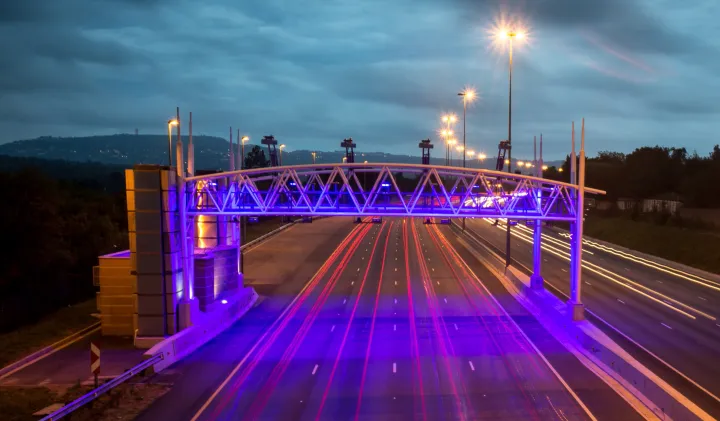DEBT BURDEN
E-tolls will soon be gone but a massive financial headache remains for the Gauteng government

It is unclear whether the Gauteng government has the financial muscle to pay 30% of Sanral’s debt plus the annual R3bn road maintenance bill. It’s also uncertain where the money will come from and where motorists will fall in this funding matrix.
The Gauteng government is hours away from switching off its unpopular electronic tolling system without having a firm or credible plan for how it will fund the expansion and maintenance of the province’s road infrastructure.
When the e-tolls system is permanently scrapped at midnight on Thursday, the Gauteng government will take over the maintenance and inspection of 201km of tolled freeways, bridges and slopes in the province — a role played by the SA National Roads Agency (Sanral) since December 2013.
This function costs at least R3-billion a year (including the recurring backlog of maintenance), which the provincial government will probably have to fund from its constrained budget.
At a media briefing on Wednesday, 10 April, Gauteng Premier Panyaza Lesufi was not forthcoming with details on how the province would come up with the money.
Lesufi would only say that negotiations for funding were under way. However, the implications remain unclear for Gauteng’s road users and ratepayers.
The practicality of scrapping Gauteng’s electronic tolling system also remains a mystery. Nobody seems to know whether motorists who complied with the system after its implementation in 2013 would be refunded (highly unlikely, with Lesufi arguing that they were beneficiaries of improved roads), or whether motorists who refused to comply with the system and racked up debt would be let off the hook.
Read more in Daily Maverick: Gauteng set to finally end e-tolls but overdue fees remain on the table
An answer to the latter question is important considering Sanral’s recent financial results show that compliance by motorists (barring minibus taxis and buses that were exempt) with the electronic tolling system reached only 17.65%.
This resulted in the system accumulating more than R9-billion in uncollectable debt from motorists who have refused to pay their toll fees since 2013.
This uncollectable debt, and money forked out by Sanral to maintain the tolling system, has to be paid by someone. And all indications are that the Gauteng government will have to cough up.
Sanral initially pumped R22.4-billion into building the e-tolls that formed part of the Gauteng Freeway Improvement Project (GFIP).
In July 2022, Sanral pumped a further R3.74-billion into the GFIP — money that was raided from government grants that were earmarked for funding untolled roads.
Only 7% of Sanral’s more than 20,000km road network is tolled.
Sanral’s untolled roads are funded through grants received from the national fiscus (or public finances) and money raised by the company in debt capital markets.
Over the years, Sanral borrowed money from the bond market to bankroll the GFIP, and in doing so, it asked lenders to buy its debt with a promise of repaying it at a later date (with interest).
Sanral’s debt associated with the GFIP is now estimated to have ballooned to R43-billion.
The plan to end e-tolls
To end e-tolls, Finance Minister Enoch Godongwana came to the rescue of Sanral and the Gauteng government by agreeing to a plan that will see the national government take over responsibility for 70% of Sanral’s debt tied to the electronic tolling system.
Godongwana has allocated an initial R23.7-billion taxpayer-funded bailout to pay Sanral’s debt and interest costs. The Gauteng government agreed to be responsible for the other 30% of Sanral’s debt, or R12.9-billion.
The provincial government has not yet come up with the money to pay its portion of Sanral’s debt.
Lesufi said his administration “has approached financial institutions” which could offer help. Discussions with lenders/funders are ongoing but remain “favourable”.
“The funders have to make representations. There is an appetite from financial institutions to settle the 30% [debt].”
The reality is that the Gauteng government cannot afford to independently foot the Sanral bill due to the province’s funding crisis.
Gauteng’s population swelled from 12.2 million in 2011 to just over 15 million in 2022, according to the latest Census, putting pressure on the province’s service delivery.
Mismanagement of taxpayers’ funds worsens the situation.
The province makes some of its money by charging people and companies a range of fees, spanning motor vehicle licences, gambling and liquor licences, fines or penalties, property rental fees and others.
These fees that the province charges (running into billions of rands – it’s expected to collect R8-billion this financial year) have been growing by less than 5% each year since 2020.
The province also receives funds and grants from the national government to cover service delivery initiatives. Much like the fees it charges people and companies in the province, money from the national government has also been constrained.
In announcing the end of e-tolls, Transport Minister Sindisiwe Chikunga offered an apology to the public for how the issue was mishandled. For instance, there were no proper consultation processes when the e-tolls were first introduced.
However, the damage (especially reputational) has arguably been done.
Since its launch in 1998, Sanral planned, financed, developed and maintained more than 20,000km of the national road network.
Now, the financial uncertainty caused by the e-toll saga could well affect SA’s drive to raise money for future infrastructure projects. DM















 Become an Insider
Become an Insider
So SANRAL barge in with this e-Toll fiasco, bugger it up, allow the costs to more than double in the first place, sign some dodgey deal with God knows who overseas, pay towards keeping the scheme lurching from crisis to crisis over a decade and now just hand it all over to Gauteng to manage (expect potholes on the highway soon)? And no-one in SANRAL loses their job?
I think not.
The corrupt and inept ANC will leave this e-Toll funding headache to the next administration.
“Since its launch in 1998, Sanral planned, financed, developed and maintained more than 20,000km of the national road network.” Planned, financed, developed and maintained 20,000km? Please show me on a map where they developed and planned these 20,000km. These were pretty much in existence pre-1998, including the Joburg motorways that they have tried to toll. I’m afraid but SANRAL is generally useless – barring a few talented people who try to make a difference. The arrogance on display during the Gauteng e-toll stuff up is beyond reason. Yet, I guess the management of SANRAL will get another CPI plus notch increase on their glorious pay packages plus bonuses this financial year.
The cherry on the top is “maintained” – if so why all the potholed roads around the country – but to be fair to SANRAL to some extent – government collects a fuel levy supposedly for roads but used for anything but – that is where the problem lies.
Surprising how many people there are who do not know enough to know what the don’t know. SANRAL is the successor to the chief Directorate of National Roads in the DoT who since 1948 has developed a peer acknowledged world class network of some 20 000 km. Always until recently with a experienced professional engineer in charge. As you say politics has now entered SANRAL and many talented professional engineers in SANRAL are now becoming unhappy. I say this based on a background as Head of National Roads during the 80s and 90s. If you want more details of the network development get a copy of my book on the history of roads in SA since well before JvR.
Indeed, SANRAL’s roads are generally (note I say generally) in pretty good nick and the maintenance projects well executed for the most part (most part – all depends on whose sticky fingers get into the individual contract pies). Its the regional and municipal roads that are mush worse off and in a neglected state with little sign of improvement any time soon.
The problem going forward is maintenence …… write off the debt.
The people who bought etags are the ones who kept this scam going for so long. The bigger problem is they signed a contract agreeing to pay SANRAL when they bought an etag. Don’t ask to be refunded now. Just cough up and pay your debt.
For the rest of the people who resisted SANRAL’s coercion, funding the debt is going to hurt. At least when it is paid, the pain will be over. That’s better than perpetually forking out millions to service a debt that would never be repaid and that would mostly be expatriated to Austria.
Much of the debt supposedly owed by non-payers has already prescribed – if they have not acknowledged the debt, made any partial payments or been summonsed by SANRAL, any debt older than three years has prescribed. So will they now start summonsing the millions who have not paid, including all the foreign traffic transitting Gauteng en route to and from other countries?
Sanral, as its name indicates, is a national roads agency. It builds roads all over SA, including recent projects on the N2 near Durban, the Free State and in the Southern Cape. For these roads, it gets money from the central fiscus. It doesn’t force Durban motorists to pay for the billion-rand N2 bridge, for example.
Gauteng’s taxpayers pay a disproportionate share of taxes which go to the central pot of money. Much of the taxes paid in Gauteng, get transferred to other provinces.
Why should Gauteng taxpayers be on the hook for the roads Sanral built in 2010 in their province, but when they build roads in KZN, the Free State or the Northern Cape, that should come from the central fiscus, to which Gauteng taxpayers do contribute, as I mentioned above?
I have a short and charming Afrikaans word for Scamral: “Voertsek!” Stop scamming Gauteng taxpayers and bugger off.
I am going to be getting up extra early on election day – and I normally get up at o5:15 in the AM – to go stand in a queue (that will not have yet formed) to participate in the privilege of removing Lesufi ‘from office’
There may be persons – readers even – impressed with Panyaza’s energy and enthusiasm – but the reality is that he is embarking on ill conceived, populist programmes that the City can not afford (or indeed sustain) which will plunge Johannesburg (and the Province) into a financial hole from which it will be almost impossible to extricate ourselves. And why? Because in his own words ‘he is serious about winning an election’. Not serious about what’s best for Johannesburg and all our residents – but so he, and his administration, can remain in Office!
Yup – etolls have been scrapped – but the debt hasn’t. Even a cursory reading of the City’s finances will tell you we cannot afford more debt – but that’s exactly what Lesufi has saddled us with. Honestly, this City should be placed under administration.
Panyaza Lesufi is only concerned about one thing – Panyaza Lesufi. He is so see-through its an embarrassment to those who at least try keep a facade of doing “whats right for the people”
The national government imposed the etolling on Gauteng, so the national government and SANRAL should be responsible for settling the debt. This debt will detract from other critical infrastructure work which should not be delayed.